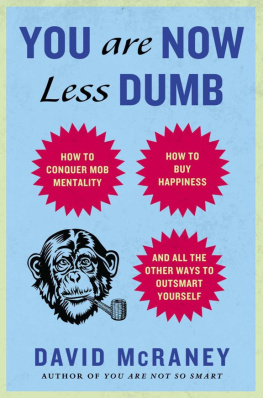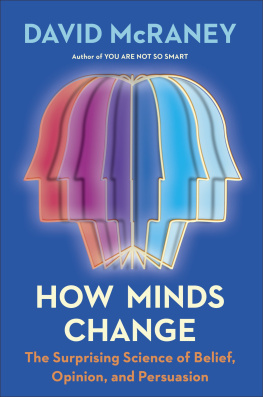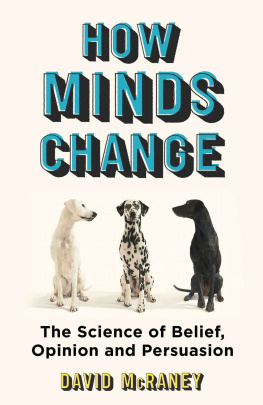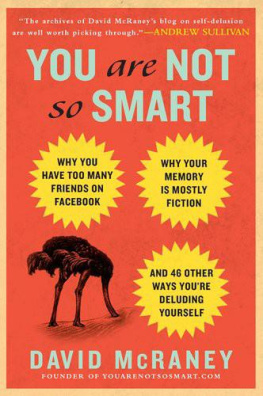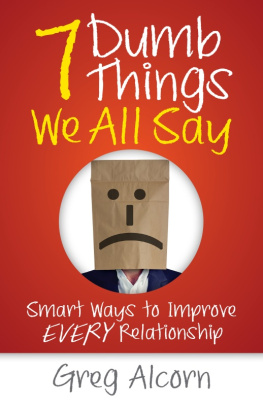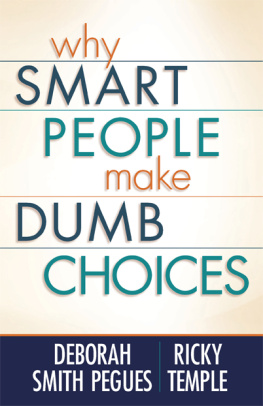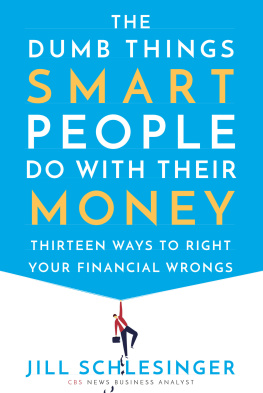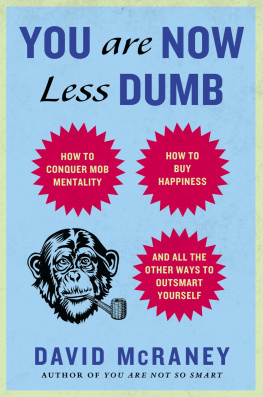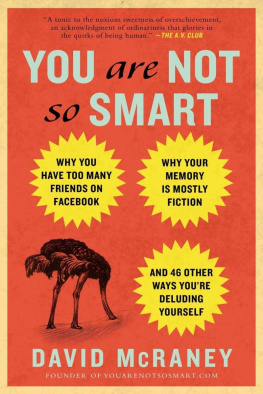Praise for David McRaneys
You Are Not So Smart
A tonic to the noxious sweetness of overachievement, an acknowledgment of ordinariness that glories in the quirks of being human.
The A. V. Club
An illuminating and just-the-right magnitude-of-uncomfortable almanac of some of the most prevalent and enduring lies we tell ourselves.
Maria Popova, Brainpickings.org
You Are Not So Smart is a dose of psychology research served in tasty anecdotes that will make you better understand both yourself and the rest of us.
Alexis Ohanian, cofounder of Reddit.com
Insightful.... McRaney acknowledges the common ways in which we compromise our intelligence every day without ever making the reader feel stupid.
The Huffington Post
McRaneys sweeping overview is like taking a Psych 101 class with a witty professor and zero homework.
Psychology Today
Simply wonderful. An engaging and useful guide to how our brilliant brains can go badly wrong.
Richard Wiseman, author of 59 Seconds and Quirkology
Want to get smarter quickly? Read this book.
David Eagleman, neuroscientist and author of Incognito: The Secret Lives of the Brain
A much-needed field guide to the limits of our so-called consciousness. McRaney presents a witty case for just how witless we all are.
William Poundstone, author of Are You Smart Enough to Work at Google?
Fascinating.... After reading this book, youll never trust your brain again.
Alex Boese, author of Elephants on Acid and Electrified Sheep
Many of us know that mass ignorance is a huge problem. Now, thanks to David McRaneys mind-blowing book, we can finally see the scientific roots of that problem.
David Sirota, syndicated columnist, radio host, and author of Back to Our Future: How the 1980s Explain the World We Live In NowOur Culture, Our Politics, Our Everything
You Are Now Less Dumb
How to Conquer Mob Mentality, How to Buy Happiness, and All the Other Ways to Outsmart Yourself
David M c Raney
GOTHAM BOOKS
Published by the Penguin Group
Penguin Group (USA) Inc., 375 Hudson Street,
New York, New York 10014, USA
USA | Canada | UK | Ireland | Australia | New Zealand | India | South Africa | China
Penguin Books Ltd, Registered Offices: 80 Strand, London WC2R 0RL, England
For more information about the Penguin Group visit penguin.com.
Copyright 2013 by David McRaney
All rights reserved. No part of this book may be reproduced, scanned, or distributed in any printed or electronic form without permission. Please do not participate in or encourage piracy of copyrighted materials in violation of the authors rights. Purchase only authorized editions.
Gotham Books and the skyscraper logo are trademarks of Penguin Group (USA) Inc.
LIBRARY OF CONGRESS CATALOGING-IN-PUBLICATION DATA
McRaney, David.
You are now less dumb : how to conquer mob mentality, how to buy happiness, and all the other ways to outsmart yourself / David McRaney.
pages cm
Includes bibliographical references.
ISBN 9781101621783
1. Thought and thinking. 2. Perception. 3. TruthPsychological aspects. 4. Defense mechanisms (Psychology) 5. Reason. I. Title.
BF441.M428 2013
153.4'3dc23
2013000586
While the author has made every effort to provide accurate telephone numbers, Internet addresses, and other contact information at the time of publication, neither the publisher nor the author assumes any responsibility for errors or for changes that occur after publication. Further, the publisher does not have any control over and does not assume any responsibility for author or third-party websites or their content.
Contents
For Maggie. Thanks for helping me get out of that swamp.
Introduction
Self-Delusion
THE MISCONCEPTION: You are a being of logic and reason.
THE TRUTH: You are a being capable of logic and reason who falls short of that ideal in predictable ways.
This is a book about self-delusion, but also a celebration of it. You see, self-delusion is as much a part of the human condition as fingers and toes, and that is what we are going to explore here. Delusions, that is, not phalanges.
You assume you are intelligent, capable, rational, and full of the same glorious reason that invented calculus and ginger snaps. You were born with a chip on your shoulder, and youve grown into a sort of undeserved confidence over the years. Its a human foible that comes in many flavors, and Im assuming you are human. If you are a hyperintelligent dog, a member of an alien race, or a robot historian from our future, I apologize; please move on to the first chapter. If not, proceed toward your epiphany.
The human mind is obviously vaster and more powerful than any other animal mind, and thats something people throughout all human history couldnt help but notice. You probably considered this the last time you visited the zoo or watched a dog battle its own hind legs. Your kind seems the absolute pinnacle of what evolution can produce, maybe even the apex and final beautiful result of the universe unfolding itself. It is a delectable idea to entertain. Even before we had roller skates and Salvador Dal, it was a conviction in which great thinkers liked to wallow. Of course, as soon as you settle into that thought, youll accidentally send an e-mail to your boss meant for your proctologist, or youll read a news story about how hot dogstuffed pizza is now the most popular food in the country. Its always true that whenever you look at the human condition and get a case of the smugs, a nice heaping helping of ridiculousness plops in your lap and remedies the matter.
The truth is that the human brain generates a mind that is deeply flawed. There are some things you just arent very good at and never will be. Evidence of your dumbness is everywhere. Calculators, notepads, to-do lists, checkbooks, alarm clocksthere are hundreds of inventions and applications for sale in every marketplace to make up for your shortcomings. Entire fields of expertise exist to make up for a gulf in your abilities.
Our discussion of the scientific study of self-delusion is probably best led off with the concept of preconceived notions, so lets begin with a brief story about the thirty-first time Dartmouth College and Princeton University faced off in football. That game helped launch an endless fleet of expeditions into the human mind, many of which you will read about after this paragraph concludes.
Both founded in the mid-1700s, Dartmouth and Princeton are part of the Ivy League of schools in the northeastern United States. Youve heard of the other six schools: Brown, Columbia, Cornell, Harvard, Penn, and Yale. For most people in the country, Ivy League has become synonymous with the sort of people who wear fancy pants. The names are among the most desired bullet points on a rsum, but Ivy League began as a term sportswriters used for the eight schools in New England that tended to compete against one another exclusively in athletics and, well, most everything else.

